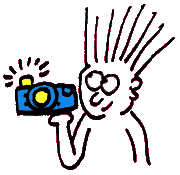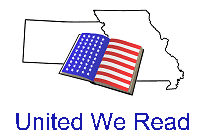Introduction
Nominations
Book
Criteria
Author
Calendar
Sponsors
Press
Book
Clubs
Reader's
Guide
Committee

Photo & Clip
Art Gallery
|
2004
United We Read
General Ideas for
Book Discussions
|
 |
How do we begin the
discussion?
Often, the host of the meeting, or the member who chose
the book can begin the conversation. It can be helpful to have each member
bring one issue/question/comment to the table. Depending on the dynamic of your
group, you may want to keep an eye on the clock to ensure that everyone has a
chance to contribute. Another tip is to choose books with reading guides and
use them to kick-start discussion. Your group could decide to choose a leader
for each meeting who will come prepared with questions and thoughts to help
move things along. You can't be expected to remember every single thing you
loved and hated about the book, so it helps to jot down notes as you read,
marking pages and passages as you go.
How do we set the tone of the meeting?
The most successful reading groups are informal,
friendly, and imaginative. It's important that all the members feel comfortable
sharing ideas and experiences. Creating a trusting and open venue for meetings
will encourage a free and lively exchange of thoughts and ideas. Brainstorm new
ways to gather and discuss with your group. Maybe you want to meet over dinner.
Perhaps you'd rather do drinks and snacks? You can match the food, drink,
atmosphere to the book you choose. For Under the Tuscan Sun, you can
serve wines and cheese of Italy. For a discussion of Candyfreak: A Journey
Through the Chocolate Underbelly of America serve candy bars and treats as
snacks. Experiment with new ways to enliven discussion. If you read The Da
Vinci Code you can bring along a printed copy of Da Vinci's Last Supper, or
an art book that includes his work. You might try to choose books that coincide
with an author reading at your local bookstore. Your reading group can attend
the reading, and discuss the book and author after the reading.
Keep in mind that discussion is the heart of a good book
club, and some of the best discussions can be over the myriad of ways that the
members hated the book. Don't be afraid to disagree with something someone
said--give members a chance to talk you out of hating (or loving) the books.
You may not always agree, but you are certain to walk out of your meeting with
a different perspective. Feel free to let the conversation stray off course.
You don't have to stick to a rigid agenda. The most important thing about your
reading group is that you talk about the book and have fun doing it.
--from Amazon.com
General Questions for Fiction Books:
What was your overall reaction to this book? Can you
remember how you felt as you read it? How does the author keep you reading? If
you had a strong emotional reaction to it, what caused that? Which parts of
this book stick most clearly in your mind? Why? Before you started to read,
what were your expectations of the book? How far did it fulfill them? Were
there any surprises?
Does the novel have an interesting title? What does it
mean? If it is enigmatic, when do you realize its significance?
How does the novel open? Is it an effective opening? If
it engages your interest if it grabs you instantly how does it do
that? Are any mysteries presented? How clear is it what is going on? Do you
need more information than you are given?
What is interesting about the way the story is told? How
are the episodes of the novel arranged and linked? Do cause and effect have a
part in the story? How does one action or decision lead to another? In your
discussion, you might want to identify where the turning points in the action
are where those moments are after which everything is different. Did you
anticipate them?
From whose point of view is the story told? What is the
effect of this? What is their personal perspective? Can we trust their
viewpoint? If the viewpoint shifts from one person to another, how smoothly
does this happen? Is it clear whose view we are getting? What is the effect of
having more than one viewpoint?
Writers do not always tell their stories in a
straightforward way. If there are foreshadowings or hints of the future, what
is their effect?
What is the novel's theme? What central message or idea
links all the other components of the novel together? Is the writer concerned
with social issues, or environmental issues for instance? If the novel has more
than one theme, which is the main one? Do the different themes complement one
another or are they quite separate? Have these ideas been explored in novels
before? If they are not original themes, what is interesting about the way this
author explores them? Is the theme universal in other words, does the
novel explore a message that is true of all people, in all places, at all
times? If the novel is an old one, is its theme still relevant today?
Where is the novel set? Is it an easily identifiable
setting? What details are used to evoke the location? If it is a real place,
how authentic is the description? Is the setting important does it
contribute anything to the novel, or is it incidental? If there is more than
one setting, are readers supposed to compare them?
How do settings affect characters? Do we associate
certain characters in the novel with certain settings? What is the effect of
this? Is there a contrast for example between town and country characters? Are
there "indoor" and "outdoor" characters, and how does the
author use the settings in which we see certain characters to shed light on
their personalities?
What did you find most interesting about the novel's
characters? Are they well drawn? How well do we get to know them? Are
characters revealed to us through description, dialogue or action? Do we ever
get inside their heads does the writer allow us into the thought
processes of characters, and what is the effect of this?
Are the characters realistic? Where is your evidence? If
the characters are stereotypes, is there a reason for this? Do any of the
characters seem totally original? If so, what is their most memorable trait?
Consider the things that motivate the characters in the
novel. What is important to the main characters in your novel? Does it seem as
if the author favors the values of a particular character? How can you tell?
How far do you agree with the choices the characters make? How much do you care
about their struggles and problems? If you become emotionally involved in
characters' lives, how did this happen? Do the characters in the novel have
control of their own destinies? Explore the relationship between Fate and free
will in the novel.
The experiences we go through in life change us. If
characters change during the novel, what causes those changes? Are they for the
better?
Consider the main relationships between characters. What
do characters reveal about themselves by their relationships? If there is
dialogue in the book, how is it handled? Does it seem natural? Do any of the
characters have a particular way of talking that reveals their personalities?
What do you find most interesting about the writer's
style? Is it unusual? Do you like it? How appropriate is the style to the
story? Try to pick out instances in the book which best illustrate the writer's
style and share them with your book group.
From the Indianapolis Marion County Public Library Web
site, http://onebook.imcpl.org/vol2/onebook_book_discussions_questions.htm
We hope you enjoy the 2004 United We Read selection, and
find the material provided here beneficial to your reading and discussion.
--United We Read Committee
|
| |
|
For further information contact:
Kansas City Metropolitan Library & Information
Network
15624 E. 24 Highway
Independence, MO 64050
Phone: (816)
521-7257
Fax: (816) 461-0966
Email: sburton@kcmlin.org
Last Updated 6/7/04
|
|

